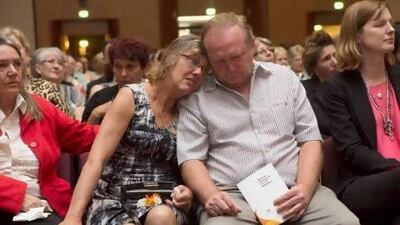SYDNEY // Australia yesterday apologised for another shameful episode in its past: the state-sanctioned practice of forcing young unmarried mothers to give up their newborn babies, sometimes after drugging them or tricking them into signing adoption consent forms.
More than 800 people, including mothers and the children removed from them, filled the Great Hall of Parliament House in Canberra to hear the prime minister, Julia Gillard, express remorse for "the policies and practices … which created a lifelong legacy of pain and suffering".
Among those listening was Christine Cole, who spent nearly 20 years campaigning for an apology and restitution. Aged 16 when she gave birth to a baby girl in 1969, she was drugged with barbiturates before and after the birth. She was not permitted to see her daughter, and was kept in a hospital annexe for five days until she signed an adoption form.
The practice of taking babies from mothers, which Ms Cole described yesterday as "cruel" and "punitive", was common from the 1950s until the 1980s, when it gradually died out as social attitudes changed. Sanctioned by governments, hospitals and religious organisations, it grew out of the stigma surrounding illegitimate children and the aversion of authorities to the financial burden of supporting them.
A Senate inquiry last year found that up to 225,000 babies were taken from their mothers shortly after birth and placed with childless married couples.
In some cases, children were earmarked for adoption months before they were born, the Senate heard. Doctors and social workers involved in the practice allegedly "ordered" babies for themselves and for friends.
Five years ago, Ms Gillard's predecessor, Kevin Rudd, apologised to members of the "Stolen Generations" - Aboriginal children who were forcibly separated from their families during the 20th century The idea behind the practice was to "breed out" the colour from mixed-race children, who were placed with white families, at a time when the Aboriginal race was believed to be dying out. Mr Rudd also apologised, in 2009, to children abused in church and state-run institutions, including "child migrants" who were plucked out of British orphanages and sent to Australia, where they were used virtually as slave labour.
Confronting yet another stain on Australian history, Ms Gillard said young mothers "were betrayed by a system that gave you no choice and subjected you to manipulation, mistreatment and malpractice".
She added: "You were forced to endure the coercion and brutality of practices that were unethical, dishonest and in many cases illegal."
The Senate inquiry heard that many young women were duped, threatened or pressured into signing adoption consent forms.
Also in the audience yesterday was Lily Arthur, who was shackled to a hospital bed in Brisbane while giving birth to her son, Tim. It was 1967, and she was 17 years old. She was allowed to cradle her baby in her arms for five minutes - but only after signing an adoption form.
Ms Arthur was living with her boyfriend when she became pregnant. The couple planned to marry. One night, police knocked on their door and arrested her on a charge of "being exposed to moral danger". She was taken to a girls' home run by the Sisters of Mercy, a Roman Catholic order, and set to work in the laundry. "I had to work every day, right up until the time I went into labour," she said. "Then the very day I gave birth I was back in the laundry that afternoon, folding pillow cases. That's how much contempt they treated me with."
It took her three decades to track down her son. Ms Cole, too, managed to trace her daughter. But their reunion was "the start of another rocky road", she said.
"She had grown up believing that her mother didn't want her, so she was angry about being abandoned," Ms Cole said. "We've tried to build a relationship as best we can, but it hasn't been easy."
The prime minister announced the provision of 5 million Australian dollars (Dh19.13m) for specialist support and mental health care of those affected, as well as assistance in tracing family members. Another A$1.5m will go to the National Archives to mount a special exhibition recording the wrongs of the practice.
"That way, this chapter in our nation's history will never again be marginalised or forgotten again," Ms Gillard said.
foreign.desk@thenational.ae

